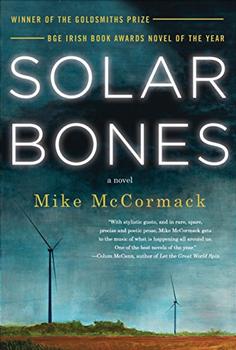Summary | Excerpt | Reviews | Beyond the book | Read-Alikes | Genres & Themes | Author Bio

Written in a poetic, line-breaking style, Mike McCormack's Solar Bones reads with a breathless urgency. The narrator, Marcus Conway, is a civil engineer with a wife and two grown children. Just like his ancestors, Marcus has lived his entire life in the county of Mayo, on the coast of Ireland. But, in the opening pages as he hears the Angelus bell (See 'Beyond the Book') ringing from the village church, it isn't really Marcus Conway who is drawn, in a sort of frenzy, to his kitchen. It's his ghost.
Marcus doesn't quite realize that he has died. He is confused and in pain. "There is something strange about all this," he says, "some twitchy energy in the ether which has affected me from the moment those bells began to toll, something flitting through me, a giddiness drawing me…" The entire novel is narrated by his ghost looking back at his life. It reads as a single breath, a moment, which may be exactly what it is: his life passing before his eyes.
Marcus begins to read the national and international new articles — which adds to his unease — some about the wars in Iraq and Afghanistan and others about how the markets are recovering from the most recent financial collapse. His memory is sparked by a smaller local story: There are plans underway to convert an abandoned industrial facility, bringing the "promise of jobs and subsidiary investment." This news item has a direct connection to him because his father helped build the facility years ago. Marcus notes that when it was originally constructed, it held "a similar promise of prosperity, it was spoken of as if it were a cathedral…a beacon of industrial progress."
For Marcus, in this opening, the wider world's events spiral down and converge to memories of his father. Later in the novel, the local news story making national headlines is about water contamination. His wandering thoughts spiral closer as we gradually learn his wife was one of several hundred people who fell ill due to an engineering oversight that allowed for the contamination.
Engineering is more than a career for Marcus, it is a "high and even noble calling." He sees his father, his wife, and his children through this lens. His wife tells him their son is academically gifted, but Marcus can't understand why he left school to go fruit-picking in Australia. Though their daughter has earned a solo art exhibition by graduating first in her class, he is embarrassed and even frightened by her experimental art when he learns that her canvases are painted with her own blood. These thought associations wind their way through the emotional centers of his life, giving us insight into the beliefs and choices that made Marcus the man he was.
The swirling effect of Marcus's memories are supported by McCormack's unique style. The book is not broken down into chapters, or even into sentences. It is written in lines of prose that break, delineating details or bouncing in a different direction. There are short phrases that repeat with slight variations, often bordered by line breaks, lending the prose a poetic quality: "sitting here in this kitchen… at this same table… this very table here… this same table…"
It took me some time to adjust to the book's style; I had to make a conscious choice to break with the expectations I brought to the text. But I am so grateful that I did. Reading this book felt a little bit like falling, a long exhale of life's pent-up anxieties. "This is how you get carried away," Marcus says. When I allowed myself to be carried away along the bumps between line breaks, it felt like a rush and a clatter toward an inner beauty and stillness.
As the Angelus bell rings in the novel's opening pages, Marcus imagines the sound gathering "all the focal points around which a parish like this gathers itself." His ghost gathers himself too, collecting the focal points of his life in a "post mortem aria." Toward the end of the novel, Marcus has what he calls "a clear view down through the vortex of my whole being." This image of a vortex is apt, as his thoughts and memories fly like debris in a tornado, spanning widely to thoughts of the region's pre-Cambrian glacial past, then narrowly to the smallest molecule of his being. There isn't any punctuation to end Marcus's swirl of memories. He is cast out "into that vast into oblivion… where there is nothing else for it but to keep going…"
![]() This review was originally published in The BookBrowse Review in November 2017, and has been updated for the
August 2018 edition.
Click here to go to this issue.
This review was originally published in The BookBrowse Review in November 2017, and has been updated for the
August 2018 edition.
Click here to go to this issue.

If you liked Solar Bones, try these:

by George Saunders
Published 2018
In his long-awaited first novel, American master George Saunders delivers his most original, transcendent, and moving work yet.

by Samantha Hunt
Published 2017
A contemporary gothic from an author in the company of Kelly Link and Aimee Bender, Mr. Splitfoot tracks two women in two times as they march toward a mysterious reckoning.
Your guide toexceptional books
BookBrowse seeks out and recommends the best in contemporary fiction and nonfiction—books that not only engage and entertain but also deepen our understanding of ourselves and the world around us.